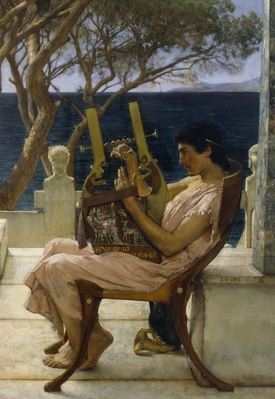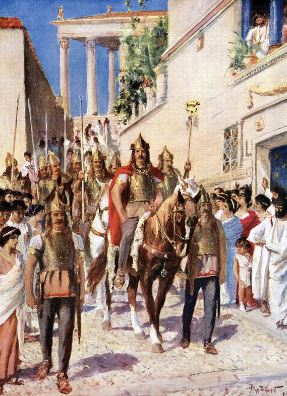Alcaeus (c. 620–c. 580 BCE) was a celebrated ancient Greek lyric poet from the island of Lesbos. Known for his influential poetry, Alcaeus’s works provide a vivid glimpse into the political and social life of his time. This article delves into Alcaeus’s life, poetry, and lasting impact on Greek literature.
Early Life and Background
Alcaeus was born in the early 7th century BCE on the island of Lesbos, a region renowned for its rich cultural and artistic heritage. His life was marked by political upheaval and personal turmoil, which deeply influenced his poetry.
- Historical Context: Alcaeus lived during a period of significant political change on Lesbos, including the rise and fall of tyrannical rule. These political dynamics are reflected in his poetry, which often touches on themes of power and conflict.
- Noble Lineage: Alcaeus came from an aristocratic family, which provided him with a privileged position in society. His social status allowed him to engage in the political and cultural life of his time, contributing to the themes explored in his poetry.
Alcaeus’s Poetry and Themes
Alcaeus’s poetry is notable for its emotional depth and exploration of personal and political themes. His work was part of the rich tradition of Greek lyric poetry and often addressed both private and public concerns.
- Political Poetry: Much of Alcaeus’s poetry reflects his involvement in the political conflicts of his time. His verses frequently criticize political figures and rival factions, offering a unique perspective on the political struggles of ancient Greece.
- Personal Themes: Alcaeus’s poetry also delves into personal experiences, including themes of love, friendship, and exile. His lyrical style captures the emotional intensity of these experiences, making his work relatable and poignant.
- Form and Style: Alcaeus was known for his use of the lyric meter, particularly the Alcaic stanza, which was named after him. His poetic form is characterized by its musicality and structure, reflecting the oral tradition of Greek lyric poetry.
Influence and Legacy
Alcaeus’s influence on Greek literature and poetry extends beyond his own time. His works have been studied and admired for their artistic quality and historical significance.
- Impact on Later Poets: Alcaeus’s poetry had a profound impact on subsequent Greek poets, including the famous lyric poet Sappho, who was also from Lesbos. His innovative use of form and themes contributed to the development of Greek lyric poetry.
- Historical Value: Alcaeus’s poetry provides valuable insights into the social and political life of ancient Greece. His works serve as important historical documents, offering perspectives on the political conflicts and cultural practices of his era.
- Modern Recognition: Alcaeus’s poetry continues to be studied and appreciated in modern scholarship. His contributions to Greek literature are recognized for their artistic merit and historical significance, cementing his place as a key figure in the tradition of lyric poetry.
Alcaeus stands out as one of the most significant lyric poets of ancient Greece. His poetry, marked by its emotional depth and political engagement, offers a rich portrayal of his time. Through his innovative use of poetic form and exploration of personal and political themes, Alcaeus left a lasting impact on Greek literature and continues to be celebrated for his artistic achievements.




